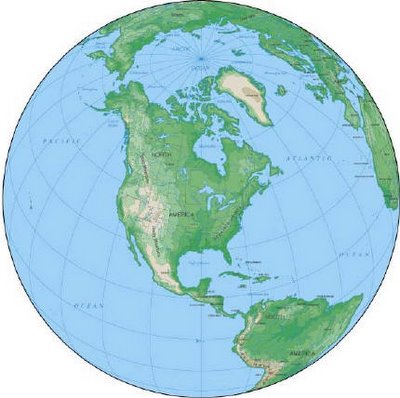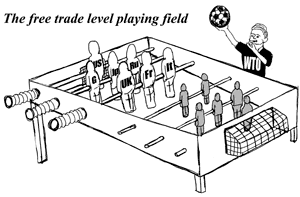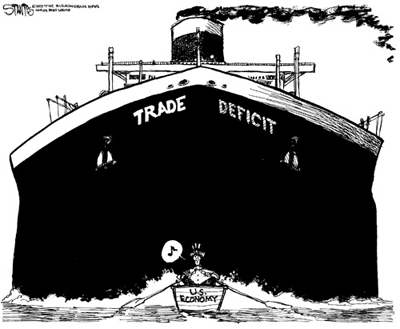 I was reading Jalopnik this morning, and they point to an article by Peter DeLorenzo of the AutoExtermist where he let's loose on the inequity of Free Trade agreements. I think we'd all like to think of our world as a fair place, but it's not. The United States is basically an open market for anyone who wants to sell products. And with the load of new trade agreements over the last few years, you would assume that trade is "free" and "fair", but you would be very wrong.
I was reading Jalopnik this morning, and they point to an article by Peter DeLorenzo of the AutoExtermist where he let's loose on the inequity of Free Trade agreements. I think we'd all like to think of our world as a fair place, but it's not. The United States is basically an open market for anyone who wants to sell products. And with the load of new trade agreements over the last few years, you would assume that trade is "free" and "fair", but you would be very wrong. Mr DeLorenzo isn't asking for protectionism, just a fair playing field. Nobody wants the government to "bail out" Ford or GM, but our trade policies put our own manufacturers at a great disadvantage. It's almost impossible for US manufacturers to sell their goods (not just cars) in many foreign markets because of their "protectionist" policies and high tarrifs on US goods.
Mr DeLorenzo isn't asking for protectionism, just a fair playing field. Nobody wants the government to "bail out" Ford or GM, but our trade policies put our own manufacturers at a great disadvantage. It's almost impossible for US manufacturers to sell their goods (not just cars) in many foreign markets because of their "protectionist" policies and high tarrifs on US goods. I know many are going to say, that US manufacturers are saddled with high "legacy" costs, because of unwise negotiaions with the unions. And that American vehicles don't sell in these other markets because they aren't as good and are too big and clumsy compared with foreign products. But that's not entirely true and not the full picture. In many European countries healthcare is government paid. In other parts of the world, things like benefits and pensions are unknown words. And American quality is recognized as being on par with any other country on the planet and superior to some.
I know many are going to say, that US manufacturers are saddled with high "legacy" costs, because of unwise negotiaions with the unions. And that American vehicles don't sell in these other markets because they aren't as good and are too big and clumsy compared with foreign products. But that's not entirely true and not the full picture. In many European countries healthcare is government paid. In other parts of the world, things like benefits and pensions are unknown words. And American quality is recognized as being on par with any other country on the planet and superior to some. US companies doing business with China have to partner up with a local company in order to do business there, and they bear the bulk of investment in these risky ventures. We import far more Chinese goods than we export to China. Japan fairs no better. To buy a Ford Mustang in Japan it would cost you as much as a loaded Mercedes, after you factor in tarrifs and other charges. The same would be said for a Ford Focus, even though it shares the same platform as the Mazda3. It's not a level playing field for US products overseas, and our policies make it too easy for anyone to sell in the US.
US companies doing business with China have to partner up with a local company in order to do business there, and they bear the bulk of investment in these risky ventures. We import far more Chinese goods than we export to China. Japan fairs no better. To buy a Ford Mustang in Japan it would cost you as much as a loaded Mercedes, after you factor in tarrifs and other charges. The same would be said for a Ford Focus, even though it shares the same platform as the Mazda3. It's not a level playing field for US products overseas, and our policies make it too easy for anyone to sell in the US. It's not just trade policies that keep US products scarce in Japan, it's national pride. Why do Japanese cars not sweep the European market? Because Europeans realize what Americans don't, if you import everything, you export all your jobs. Manufacturing jobs have always been the step up the economic ladder for Americans, and if you take that away you doom many generations to poverty. Let's also remember that many countries like Japan and China manipulate their currency to keep that trade imbalance in place.
It's not just trade policies that keep US products scarce in Japan, it's national pride. Why do Japanese cars not sweep the European market? Because Europeans realize what Americans don't, if you import everything, you export all your jobs. Manufacturing jobs have always been the step up the economic ladder for Americans, and if you take that away you doom many generations to poverty. Let's also remember that many countries like Japan and China manipulate their currency to keep that trade imbalance in place.Read Jalopnik's post and then my past post on this subject here;
Jalopnik post on this
My July post on trade
I don't claim to know the answers, but found these two articles interesting.

2 comments:
The funny thing is, if you talk to the Japanese, they actually actually believe they have the RIGHT to access the American market but we cannot access theirs. We need serious trade reform.
What gets me mad is when they trash our country. If it weren't for the US, Japan would be in economic hell (With their government controlled/supported industries).
Shawn, not just the Japanese, don't forget the Koreans and the unsucessful Malaysian companies like Proton. And of course the Chinese are counting on the American public to make them an international sucess.
Our open and transparent market is where every country hopes to import their goods, while we don't have the same opportunity in their markets. Sometimes it's just cultural enlightened self interest, which Americans can't seem to grasp.
Ahmad, welcome, I can't answer your comment, because I've never had the opportunity to drive European markte cars. So I'll take your word for it. But I also still insist, that it is in some what cultural as well. A sort of inbred protectionism. Not saying that in a negative way, just that many Europeans know where their bread is buttered. Also it is a fact that many American cars are not suited to European city roads. But the same could be said for many foreign cars and American roads.
Post a Comment